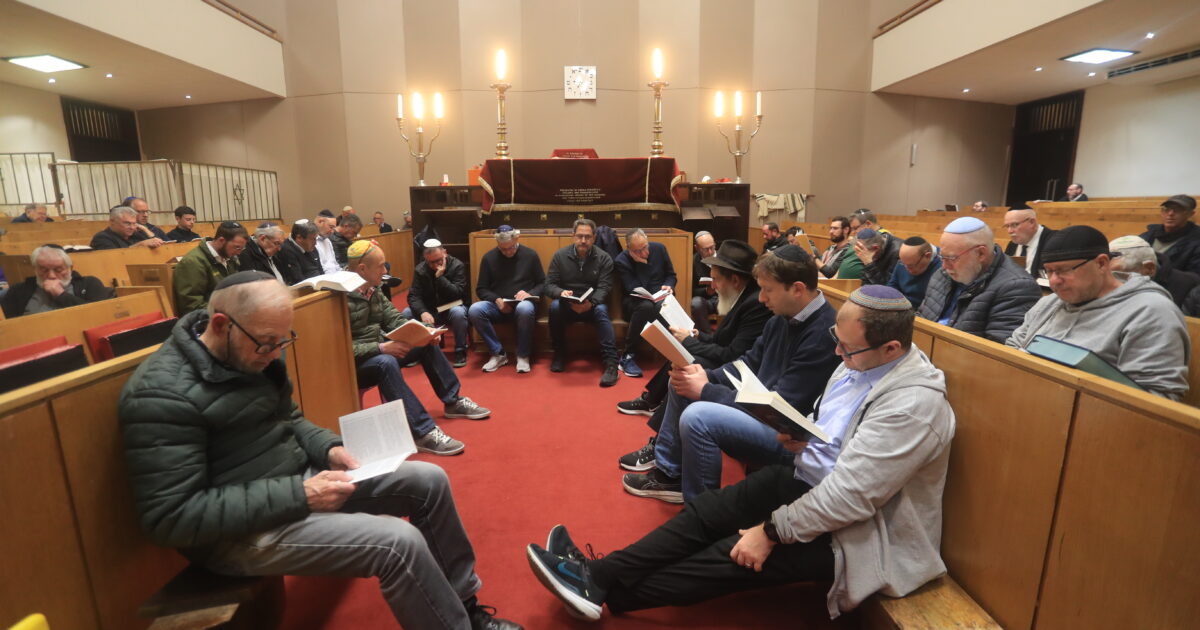Featured Item
As Israelis keep calm, ‘comrades’ duck for cover

At a time of mourning like Tisha B’Av, it’s difficult to face the trauma of the Jewish community since Hamas attacked the south of Israel on 7 October. However, speakers at Pine Street Shul in Johannesburg on Monday, 12 August, conveyed Israel’s resilience and ability to triumph over tragedy.
Tali Pimstein, a 20-year-old student at the University of the Witwatersrand, shared her experience of a recent South African Union of Jewish Students (SAUJS) trip to Israel, in which they took along 15 students affiliated with the African National Congress and Economic Freedom Fighters to learn more about the land and its history.
“The point of the trip was to ensure that we maintain the current environment towards Jews on campus while empowering youth leaders with education. This struggle is so much more than education for us individuals, rather it’s a step forward towards creating a brighter future and a field for solidarity,” she said.
In spite of the fact that the students had read on social media that Israel was an apartheid state and was committing genocide against the Palestinians, there was a flood of applications to go on the trip.
The 15 chosen students were nicknamed “the comrades”. Pimstein said they and the five Jewish students on the trip were prepared to engage in some tough dialogue about Israel and the war in Gaza.
When they went to the south of Israel, everyone was in shock at the devastation that Hamas had wrought, particularly at the site of the Nova music festival and kibbutz Kfar Aza.
“One of the things that stuck out for me was how [the site of the Nova festival] wasn’t a place of statistics, facts, and numbers, but every single monument humanised every individual that was murdered at the festival,” said Pimstein.
The group heard from survivors of these attacks first-hand. “Not only were we standing in a place where Jews were murdered for being Jews, but in the background, we were seeing bombs exploding. It made us feel raw. There was no way to detach ourselves from our feelings.
“We couldn’t just see and feel the impact of war, but also hear it in the consistent background noise of bombing in Gaza 3km away from us,” said Pimstein.
“I was overwhelmed by an immense sense of loss and grief on seeing first-hand the horrific destruction wrought by hatred. It gives us all a glimpse into the beyond-horrendous reality that Israelis have dealt with over the past 10 months.”
Though her Jewish peers expected some war noise while they were in the south, “the comrades” were shocked and feared for their lives, Pimstein said. It reminded her that bombs, rockets, and sirens aren’t normal and shouldn’t be taken lightly, but are considered normal in Israel today.
Rabbi Yehuda Stern said that on his recent trip to Israel, in spite of all the tension of a pending attack from Iran, he felt Israel’s resilience, making Tisha B’Av even more poignant.
Stern had been unsure if his solidarity trip to Israel would go ahead, with Ethiopian Airlines stopping flights to Israel for two days.
However, “We landed in Israel, and it’s as if nothing is happening. The cafes are full. The restaurants are full. I’m asking myself, if rockets are about to come from Iran, why is everyone just hanging out over there? They should be hanging out in their bunkers, in their mamads, under their houses.
“This is the pillar of Israeli society,” Stern said. “I felt more upbeat about Israel’s situation than I did in Johannesburg. Israelis are resilient. They are believers. They are supernatural. They are miraculous. That keeps them going. Even during crazy times like this.”
Stern told stories of people he had met on this trip who had been injured in Gaza and still wanted to go back to defend Israel. He also told the story of Rami Davidian, a 59-year-old farmer who was able to drive in and out of the forests of the Nova festival, saving the lives of 750 people.
A New Jersey rabbi had shared, Stern said, that, “In the year that Rosh Hashanah falls out of Shabbos and there’s no tikiya shofar, on the first day of Rosh Hashanah, like our year was, one of two things can happen. It’s either a day of destruction, or it’s going to be a year of the rebuilding of the Beit Hamikdash.”
“We have had our destruction,” said Stern. “It’s now time to rebuild like the people of Israel are doing.”
